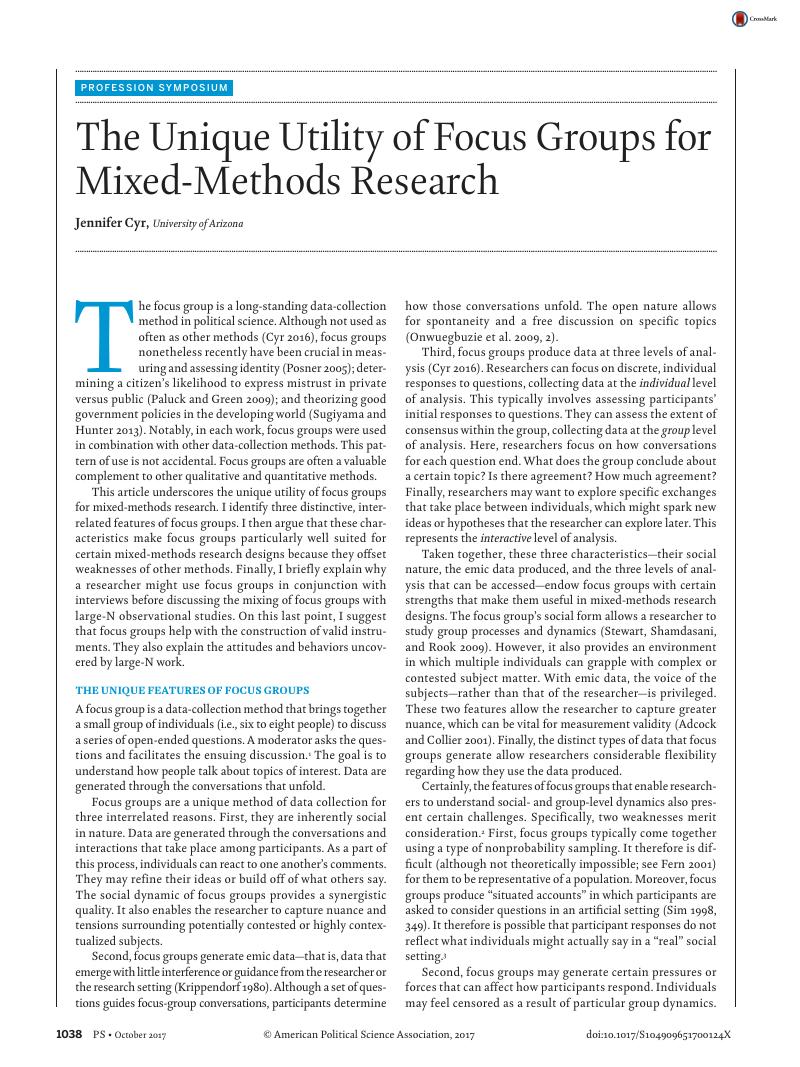Crossref Citations
This article has been cited by the following publications. This list is generated based on data provided by Crossref.
Bäck, Emma A
Bäck, Hanna
Fredén, Annika
and
Gustafsson, Nils
2019.
A social safety net? Rejection sensitivity and political opinion sharing among young people in social media.
New Media & Society,
Vol. 21,
Issue. 2,
p.
298.
Azevedo, Américo
and
Almeida, António
2021.
Grasp the Challenge of Digital Transition in SMEs—A Training Course Geared towards Decision-Makers.
Education Sciences,
Vol. 11,
Issue. 4,
p.
151.
Bunting, Hannah
Gaskell, Jennifer
and
Stoker, Gerry
2021.
Trust, Mistrust and Distrust: A Gendered Perspective on Meanings and Measurements.
Frontiers in Political Science,
Vol. 3,
Issue. ,
Berg, Janne
Lindholm, Jenny
and
Högväg, Joachim
2021.
How do we know that it works? Designing a digital democratic innovation with the help of user-centered design.
Information Polity,
Vol. 26,
Issue. 3,
p.
221.
Kanashiro, Lilian
Dammert, Lucía
and
Hernández, Wilson
2022.
Communication and Smart Technologies.
Vol. 259,
Issue. ,
p.
354.
Sharma, Bonita B.
Small, Eusebius
Okumu, Moses
Mwima, Simon
and
Patel, Mansi
2022.
Addressing the Syndemics of HIV, Mental Health, and COVID-19 Using the Health and Human Rights Framework among Youth Living with HIV, in Uganda: an Interpretive Phenomenological Study.
Journal of Human Rights and Social Work,
Vol. 7,
Issue. 3,
p.
285.
Haney, Julie M.
Jacobs, Jody L.
Barrientos, Fernando
and
Furman, Susanne M.
2022.
HCI for Cybersecurity, Privacy and Trust.
Vol. 13333,
Issue. ,
p.
135.
Haney, Julie M.
Jacobs, Jody L.
and
Furman, Susanne M.
2022.
An Investigation of Roles, Backgrounds, Knowledge, and Skills of U.S. Government Security Awareness Professionals.
p.
1.
Al-Najjar, Enas
Sukor, Nur S.A.
and
Shbeeb, Lina I.
2022.
Addressing safety issues along the way to school: Qualitative findings from Jerash camp, Jordan.
Journal of Transport & Health,
Vol. 26,
Issue. ,
p.
101370.
Gordon, Joel A.
Balta-Ozkan, Nazmiye
and
Nabavi, Seyed Ali
2023.
Price promises, trust deficits and energy justice: Public perceptions of hydrogen homes.
Renewable and Sustainable Energy Reviews,
Vol. 188,
Issue. ,
p.
113810.
Gordon, Joel A.
Balta-Ozkan, Nazmiye
and
Nabavi, Seyed Ali
2023.
Divergent consumer preferences and visions for cooking and heating technologies in the United Kingdom: Make our homes clean, safe, warm and smart!.
Energy Research & Social Science,
Vol. 104,
Issue. ,
p.
103204.
Guler, Jessy
Stewart, Kearsley A
de Vries, Petrus J
Seris, Noleen
Shabalala, Nokuthula
and
Franz, Lauren
2023.
Conducting caregiver focus groups on autism in the context of an international research collaboration: Logistical and methodological lessons learned in South Africa.
Autism,
Vol. 27,
Issue. 3,
p.
751.
Sokolić, Ivor
2023.
Claims to ignorance as a form of participation in transitional justice.
Cooperation and Conflict,
Vol. 58,
Issue. 1,
p.
102.
Torres, Ayse
Kaya, Cahit
Akinola, Olayemi
and
Gonzalez, Rene
2023.
Investigating Reliability, Validity, and Measurement Invariance of the Eight-Item Vocational Rehabilitation Engagement Scale With a Sample of Multilingual Clients.
Rehabilitation Counseling Bulletin,
p.
003435522211472.
2023.
Leveraging Social Cohesion for Development Outcomes.
Kiskaddon, Erin
Dalyander, P. Soupy
DeJong, Allison
McHugh, Colleen
Parfait, Jessi
Littman, Abby
Hemmerling, Scott A.
and
Dausman, Alyssa
2023.
Evaluation of emission reduction and other societal and environmental outcomes: Structured decision making for the Louisiana climate action plan.
Journal of Environmental Management,
Vol. 345,
Issue. ,
p.
118936.
Brummel, Lars
2023.
When do societal stakeholders matter for agency‐CEOs? The role of stakeholder arrangements and social media attention.
Public Administration,
Vol. 101,
Issue. 4,
p.
1549.
Cowan, Harry James Kinneil
Sheppard, Loretta
and
Harrington, Rosamund
2024.
Young adults with intellectual disabilities participating in employment‐related activities using the pathways and resources for engagement and participation intervention: A case study.
British Journal of Learning Disabilities,
Kessler, Gabriel
Vommaro, Gabriel
Rodríguez-Raga, Juan Carlos
and
Calderón Herrera, Juan Andrés
2024.
La sociedad contra las élites: aproximación a las bases sociales del apoyo electoral a Petro en Colombia.
Colombia Internacional,
p.
3.
Berry, Larissa
Shahid, Sabrina
and
Sadeghi, Mahdi
2024.
Effect of COVID-19 on Menstruation and Lower Reproductive Tract Health [Letter].
International Journal of Women's Health,
Vol. Volume 16,
Issue. ,
p.
561.





